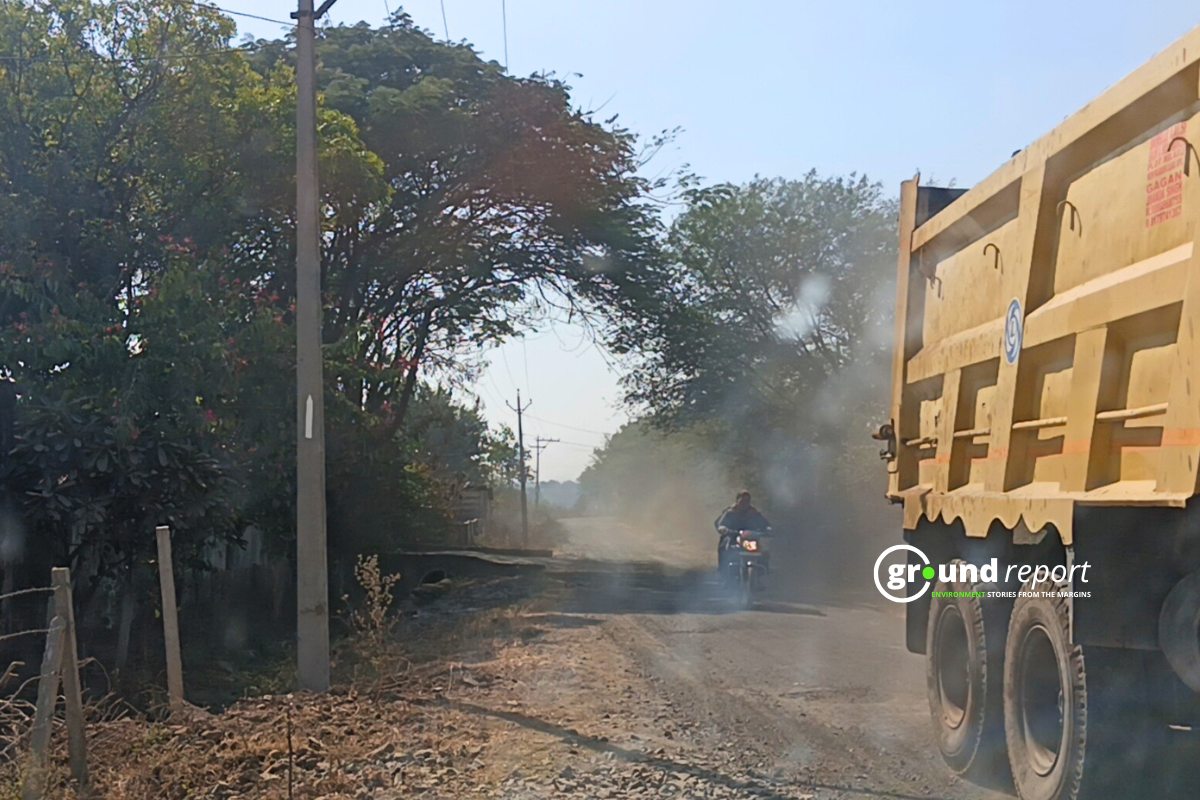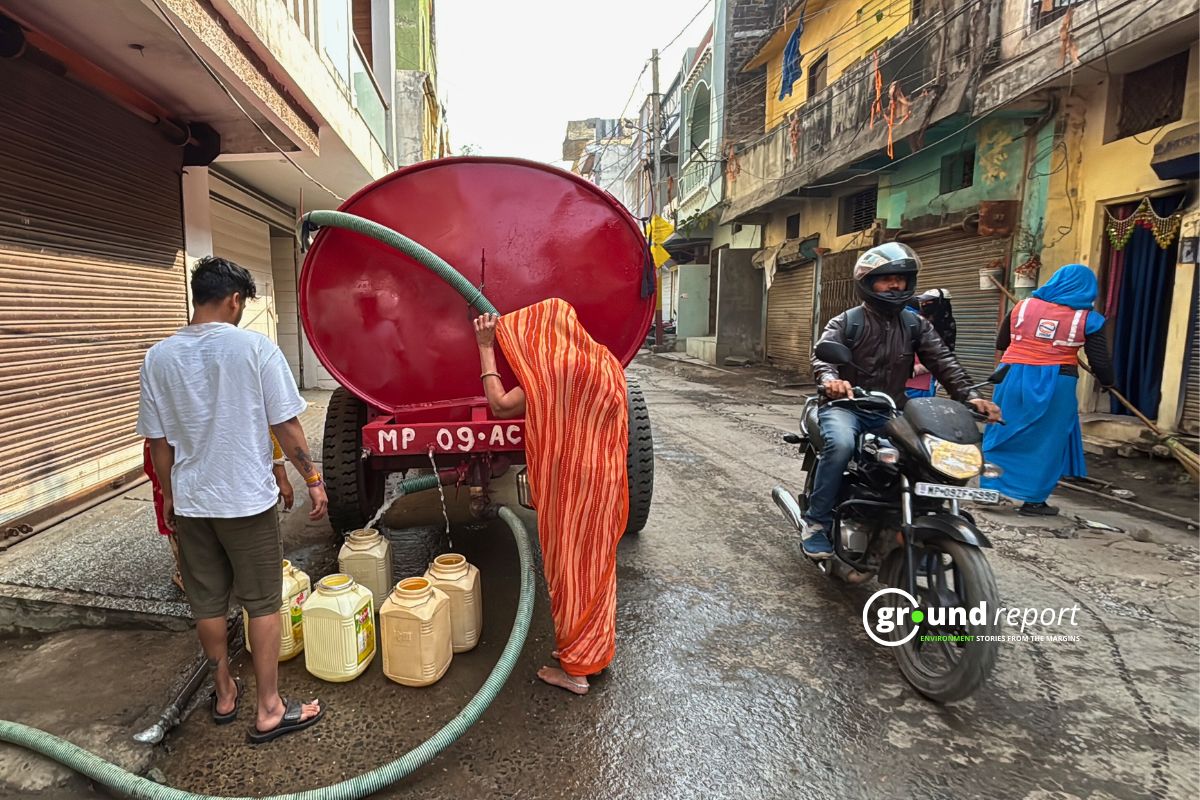An environmental crisis is unfolding along the banks of Nallah Sindh, a historically significant water body in the Ganderbal district, of central Kashmir. Nallah Sindh, once revered for its pristine waters and abundant aquatic life, now faces an existential threat due to improper waste disposal and inadequate management.
Originating from freshwater springs at nearly 3,000 meters, Nallah Sindh flows through Sonamarg and serves as a vital water source for central Kashmir, including Srinagar.
The crisis threatens Ganderbal’s tourism industry, known for its scenic beauty, lakes, and glaciers, attracting thousands of tourists annually, including Amarnath pilgrims. The deteriorating environmental conditions risk damaging the area’s appeal.
From Scenic route to waste dump
The Gagangeer to Wayil areas have become dumping grounds of solid waste, including plastic bags and polythene into the river. Nazir Ahmad Sheikh, a 52-year-old Margund resident, lamented, “The foul smell from these garbage dumps has made our lives miserable. It’s turned from pride to shame and health concerns. Stray dogs near this dumping site have bitten many people in the past two to three months. Our pleas to get this garbage removed have been ignored.”

A resident complained that near the Sindh River, especially in Satruna 20 meters from the Sindh River, people dump waste and garbage indiscriminately. This disposal is destroying the river’s natural beauty and causing serious health issues.
Ganderbal’s growing waste challenge: projections and realities
The data from the Municipal Council of Ganderbal highlights the seriousness of the situation. In 2020, Ganderbal City produced 16 quintals of solid waste per day, with an approximate per capita waste generation of 350 grams daily. With a population of around 35,000 and 7,500 households, this waste volume requires proper management.
The Ganderbal Master Plan – 2032 projects a challenging future for waste management. It expects solid waste generation to reach 28.46 metric tons (MT) per day by 2032. In 2012, Ganderbal generated 16.86 MT of waste daily. By 2017, this increased to 19.17 MT, and 21.81 MT per day by 2022. Projections suggest 24.97 MT of waste daily by 2027, and 28.46 MT per day by 2032.
Food waste is the largest part of the district’s MSW, followed by wood items and bones/shells. The significant presence of recyclable materials highlights the potential for effective recycling programs. Recent initiatives aim to address the waste management crisis. In 2022, committees were established at the Panchayat level to implement the Solid Waste Management (SWM) project in rural areas. An official from the district administration explained,
“Bye-laws were enacted at the Panchayat level through Gram Sabha Resolutions, involving PRIs and other stakeholders. User charges were determined for households and establishments based on Panchayat-level bye-laws.”
From November 2022 to July 2023, Rs 5,000 per Panchayat per month were pooled at the block level. Agencies were hired through e-tendering in each block for waste transportation from primary collection sites to segregation sites for disposal.
Implementing these measures has been challenging. Mohammad Yusuf, the Swachh Bharat Mission sanitation block in charge of Kangan block said, “In Kangan, we generate almost 600 kg of waste daily. Our main issue is people disposing of inappropriate items like cement in the dustbins, complicating collection and segregation. We have eight segregation sheds in different parts of Kangan and a plastic waste plant in Wussan”.
He added,
“Our next step is to distribute individual dustbins to each household for better waste collection. However, the main challenge is the mixing of dry and wet waste by residents, complicating segregation efforts. The Satruna was a temporary dumping site for a while, but that ended after a few days.”
However, as per local claims, both local shopkeepers and authorities still dump waste at Satruna Kangan. The residents also accuse authorities of negligence in removing dumping waste. Meanwhile, officials point fingers at residents for indiscriminate dumping.
Rainy Season: Overflowing drains worsen crisis
The waste management crisis is evident during the rainy season. Jahangir Ahmad, President of the Traders Union Kangan, expressed frustration, “The drains aren’t cleaned regularly. Garbage and silt clog them, causing overflow. We’ve asked to cover the drains, but no luck. During rainfall, the foul smell from the drains worsens, turning our market into a cesspool.”
Shopkeepers in Kangan market complain about the lack of waste bins and a proper dumping site, leading to littering. This creates an unsightly environment and attracts stray dogs, posing a threat to locals and visitors.
The officials from the Rural department said,
“We’ve been advising shopkeepers not to throw garbage in drains and streams. Kangan market is in a rural area, so we lack municipal facilities. We’ve identified a dumping site with Civil Society Kangan and the traders union, which will be operational soon,” they said.

Improper waste management affects aesthetics, public health, and the local ecosystem, particularly the trout population in Nallah Sindh. Parviaz Ahmad, a local activist, stated,
“Nallah Sindh is home to rare and high-quality trout species. Despite pleas, the authorities have ignored the issue. The declining water quality due to waste dumping is pushing these species towards extinction.”
The unscientific disposal of unsegregated solid waste along riverbanks increases pollution, threatening the river’s ecosystem, species and local communities. Native fish species, accustomed to clean water, now facing eutrophication (Algal Blooms) a harmful consequence of increased water pollution. Improper waste disposal contaminates water, causing diseases like cholera and diarrhoea, according to multiple studies. Chemicals in polluted water can lead to cancer and hormonal issues, especially in children and pregnant women. Swimming in polluted water can cause skin rashes and infections.
Action Needed
The Ganderbal district administration has intensified efforts for solid waste management in response to mounting challenges. Deputy Commissioner Shyambir called for collaborative efforts to support the administration’s initiatives.
Additional District Development Commissioner Mushtaq Ahmad said,
“We’ve been actively working on Solid Waste Management for the past year. The necessary infrastructure is in place, and door-to-door waste collection has begun in all district blocks. We appeal to all residents to pay the user charges for the sustainability of the SWM program.”
Ganderbal faces waste management challenges. The coming months will be crucial for Nallah Sindh and the region’s environmental health. The success of recent initiatives, community awareness, and participation are essential to preserve the natural beauty and resources of this Kashmir district for future generations.
Keep Reading
Tank under construction, dam under repair & Chanderi Village struggles for water?
Constructed wetlands can provide a solution for wastewater treatment
Indore Reviving Historic Lakes to Combat Water Crisis, Hurdles Remain
Jal Shakti Abhiyan: Catch the Rain 2024 Emphasizes Women in Water Conservation
Follow Ground Report for Environmental News from India. Connect with us on Facebook, Twitter, Koo App, Instagram, Whatsapp and YouTube. Write us at GReport2018@gmail.com and subscribe to our free newsletter.
Don’t forget to check out our climate glossary, it helps in learning difficult environmental terms in simple language.










